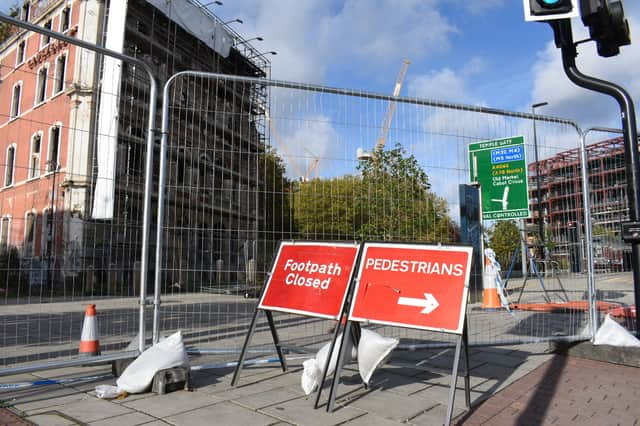Grosvenor Hotel: Update on Bristol eyesore as commuter route still blocked off


For over a year thousands of commuters have been squeezed into a narrow temporary footpath in Bristol after a fire ravaged a derelict hotel.
The Grosvenor Hotel near Temple Meads was badly damaged by the fire last October, yet little has happened since.
Advertisement
Hide AdAdvertisement
Hide AdAfter the fire, Bristol City Council blocked off a busy commuting route around the derelict building on Temple Gate, used by many people to walk or cycle into the city centre. Large fences were put up for safety reasons, in case the building suddenly collapsed.
A temporary footpath was created on one lane of road, for people travelling from Temple Meads up to Victoria Street. But this is much narrower than the previous pavement and also shared by people cycling or riding scooters, who previously used a newly built bike path near the hotel.
Green Councillor Ed Plowden said: “For over 20 years this building has been a blight on Bristol providing a poor welcome to our city for people arriving at Temple Meads. A full year ago the fire should have been the final nail in its coffin. Since then the surrounding streets have been further fenced off, impacting bus users and people walking and cycling to the city centre especially from South Bristol and parts of East Bristol.
“The council has powers to intervene, but despite repeated requests to the Labour administration I have been unable to get a clear answer about what the plan is, and how long this deeply problematic situation will last. In fact, when I tweeted a question about it, the mayor’s only response was to block me. We need the council to really get a grip on the situation.”
Advertisement
Hide AdAdvertisement
Hide AdThe building is understood to be in a “dangerous condition”, and the exclusion zone surrounding it will stay until the structure is made safe. The building is owned privately, by Nimish Popat, a businessman, who was ordered by a court to make the building safe.
In September one council boss revealed that bats could block the demolition of the hotel. John Smith, executive director of growth and regeneration, told a scrutiny committee that ecologists had carried out a bat survey, and the results were due “any day”.
Bristol City Council was asked whether the works have been done to make the building safe, if bats were found roosting in the hotel, and when the building would finally be demolished.
A council spokesperson said: “The building is the responsibility of the owner. The deadline placed by the court order has passed and the council has been continually engaging with the owner to urge them to fulfil their legal obligations. We are continuing to seek legal action to ensure that the building is demolished safely at the owner’s expense.”
Advertisement
Hide AdAdvertisement
Hide AdThe council does have the power to carry out the necessary works itself, through enforcement control rules. However, Mr Smith previously said: “We would rather not do that because obviously it’s the responsibility of the owner, and there’s issues with costs.”
Comment Guidelines
National World encourages reader discussion on our stories. User feedback, insights and back-and-forth exchanges add a rich layer of context to reporting. Please review our Community Guidelines before commenting.